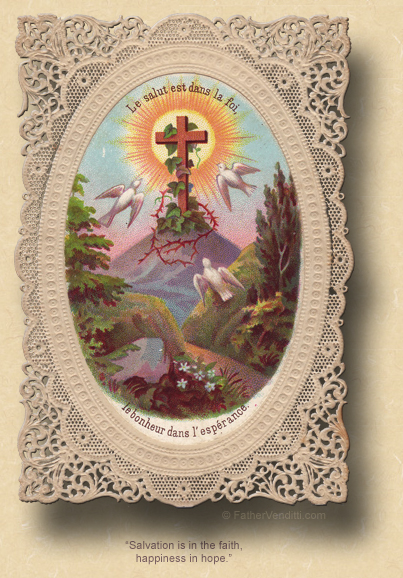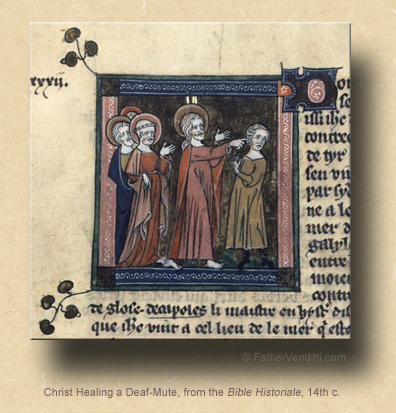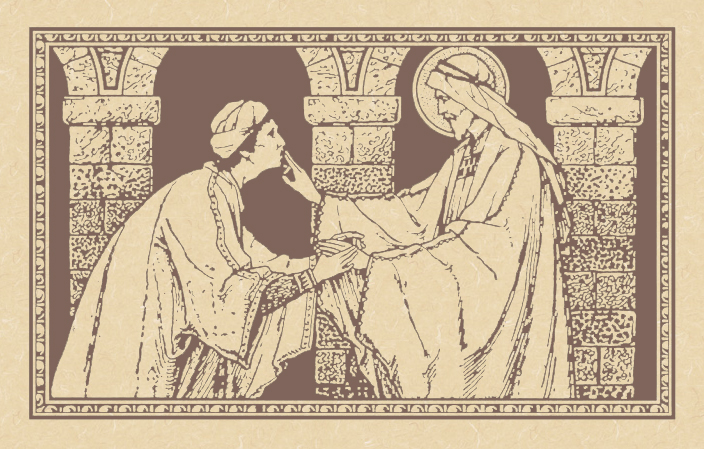So What?
The Twenty-Third Sunday of Ordinary Time.
Lessons from the secondary dominica, according to the ordinary form of the Roman Rite:
• Isaiah 35: 4-7.
• Psalm 146: 7-10.
• James 2: 1-5.
• Mark 7: 31-37.
The Sixteenth Sunday after Pentecost.
Lessons from the dominica, according to the extraordinary form of the Roman Rite:
• Ephesians 3: 13-21.
• Psalm 101: 16-17.
• Luke 14: 1-11.
FatherVenditti.com
|
1:05 PM 9/9/2018 —
Then the eyes of the blind shall be opened, and the ears of the deaf unstopped; then shall the lame man leap like a hart, and the tongue of the dumb sing for joy, For waters shall break forth in the wilderness, and streams in the desert; the burning sand shall become a pool, and the thirsty ground springs of water… (Isaiah 35: 5-8 RSV).
 It’s a different translation of part of our first lesson from the Prophecy of Isaiah; and, like most of the books of the prophets in the Old Testament, it’s about two-thirds poetry; and, like most poetry, it can be very difficult to comprehend. But this one is fairly easy: “Then the eyes of the blind shall be opened, and the ears of the deaf unstopped…” He’s prophesying about the coming of the Messiah. And that’s why Isaiah’s prophesy is in the Bible: the ears of the deaf were unstopped as we just read in the Holy Gospel. It’s a different translation of part of our first lesson from the Prophecy of Isaiah; and, like most of the books of the prophets in the Old Testament, it’s about two-thirds poetry; and, like most poetry, it can be very difficult to comprehend. But this one is fairly easy: “Then the eyes of the blind shall be opened, and the ears of the deaf unstopped…” He’s prophesying about the coming of the Messiah. And that’s why Isaiah’s prophesy is in the Bible: the ears of the deaf were unstopped as we just read in the Holy Gospel.
The liturgy of this Sunday's Mass is a call to foster that forgotten virtue: the virtue of Hope. In my own examination of conscience I've found myself wringing my hands over the current situation in the country, in the world, in the Church, as if I've never heard of this virtue. Of course, that's a failing on my part. Has the world never been on the brink of global disaster? What was going on in the three years prior to World War I? Has the country never been in a state of moral decline? What do you call the “roaring twenties”? Has the Church never been caught in the throws of scandal before now? Who were the Borgias? Who were the Medicis? What was the burning of Joan of Arc, or the condemnation of Galileo? What was the Inquisition? If you think the current scandal in the Church is the worst that’s ever been, then you must have been sleeping through history class. Someone came to me once—not in confession, otherwise I couldn't make mention of it—to complain about the current pope condemning air conditioning in one of his encyclicals, and I pointed out, “Yeah, and Pope Gregory XVI condemned railroads, but the Church survived.” The Church always survives. Christ guarantees it.
“Say to those whose hearts are frightened: Be strong, fear not!" (Isaiah 35: 4 NABRE). But Msgr. Knox's translation of our first lesson has so much more panache:
Take courage, and have no fear; see where your Lord is bringing redress for your wrongs, God himself, coming to deliver you! Then the eyes of the blind shall be opened, and deaf ears unsealed; the lame man, then, shall leap as the deer leap, the speechless tongue cry aloud. Springs will gush out in the wilderness, streams flow through the desert; ground that was dried up will give place to pools, barren land to wells of clear water… (vs. 4-7 Knox).
Israel is in its darkest hour: the Temple has been destroyed, the once-great kingdom is no more, the glory of Solomon is gone, the people have been driven from their home and live in exile, never again to see in their life-time the land given to them by God. They have no hope. And the Prophet Isaiah lifts up his voice in this darkness and shouts, “Be strong, fear not! Here is your God….”
Our Gospel lesson today is our Blessed Lord doing one of the things Isaiah predicts will mark the return of God: He restores hearing and speech to a deaf mute; and, we are well familiar with the other occasions where our Lord did the other things of which the Prophet speaks, giving sight to the blind and causing the lame to walk. We can look back almost three thousand years after Isaiah is dead and buried and see his words fulfilled in the miracles of our Lord; but, it is sobering to consider that, when our Lord performed these miracles, Isaiah had been dead already at least six hundred years, if not a thousand. When the Prophet told the Israelites to “Be strong, fear not! Here is your God, he comes with vindication…”, I'm sure that even those who believed him weren't expecting to have to wait a thousand years to see it happen.
Not long before he died, I had a conversation with Father Groeschel, who had been one of my professors in the seminary, and asked him if, in light of all the things that had happened with priests abusing young people, whether general respect for the Holy Priesthood would ever return to secular society; and he said, “Oh yes, it will come back, but not in our life-time.” We suffer from the handicap of being alive: our historical perspective begins on the day we're born, and we don't like to think about what's going to happen after we're gone. We judge the condition of affairs based on our own experience, but our own experience is not even a single life-time.
Ever watch Law and Order? Of course you have. Everybody has. We turn on an episode of Law and Order, and they all begin the same way: someone minding his own business stumbles upon a body, and before the hour is up, they've prosecuted the case. Less than an hour if you take out the commercials. But we can't possibly believe that a murder has been committed and the case brought to a conclusion in the course of an hour, because it's all make-believe. A few of us may be fortunate enough to see God begin something, a few of us may get to see God end something, most of us only get to see a small piece of it in process; but, nobody gets to see the whole show. A Catholic should be someone who's able to think in centuries.
And this is where that ever-elusive virtue of Hope comes into play, and it's our Lord Himself who gives us the lesson on how to cope in those times when everything seems dark. You know, there is nothing in the Holy Gospels that's trivial; there is nothing written by the Evangelists that qualifies as what modern-day authors call “providing color.” Every detail of every scene in the life of our Blessed Lord means something; and, when the people of the Decapolis bring to Him a man who can neither hear nor speak, what's the first thing our Lord does? Re-read the Gospel: “He took him off by himself away from the crowd” (Mark 7: 33 NABRE).  Why take him away? Why must the two of them be alone? Why can't our Lord cure the poor man in front of everyone? He could if He wanted to, certainly; but, remember that everything our Lord says and everything our Lord does has a double meaning: He doesn't do something simply for the expediency of the moment, He does it for us as well. He takes this man away from everyone just as He desires to take us away so that we can be alone with Him in prayer. Why take him away? Why must the two of them be alone? Why can't our Lord cure the poor man in front of everyone? He could if He wanted to, certainly; but, remember that everything our Lord says and everything our Lord does has a double meaning: He doesn't do something simply for the expediency of the moment, He does it for us as well. He takes this man away from everyone just as He desires to take us away so that we can be alone with Him in prayer.
Saint John Vianney used to observe a man in his parish who would make a point of visiting the church every day, but only at a time when he knew the church would be empty. He would go in and kneel before the tabernacle for as long as he could before someone else came in, at which point he would leave. He never had a Rosary or a prayerbook with him, and his lips never moved in prayer. And one day the holy priest stopped him and asked him what he did when he knelt before the Blessed Sacrament, and the man replied, “I look at Him, and He looks at me.”
To be alone with our Lord. Some of us can't even stand to be alone with ourselves. We get into the car to go somewhere; what's the first thing we do? We turn on the radio, or we hit the hands free whatever and call someone to talk. When we're at home doing the laundry or something, we always have the TV blaring the background. If we can't stand to be alone with ourselves, how can be possibly be alone with God? And if we can't be alone with God, how can we ever find peace in prayer?
What's the next thing our Lord does? He puts His fingers into the man's ears, and with His own saliva touches his tongue. He's not doing this for some kind of dramatic effect; remember, there's no one there to see it. And it surprises me how many people are not able to recognize these actions. Ever attended the baptism of an infant? The priest touches the baby's ears and blows on his lips, and says, “May the Lord Jesus, who made the deaf hear and the dumb speak, grant that at the proper time you may hear His word and proclaim the Faith.” And here we see, in this cure, an image of how our Lord acts in our own souls: it's through the sacraments of the Church that Christ frees us from sin, opens our ears to hear the Word of God, loosens our tongues to praise and proclaim the Faith. Saint Augustine, commenting on this passage, says that the tongue of someone united to God “will speak of the Good, will bring to agreement those who are divided, will console those who weep. God will be praised, Christ will be announced” (Sermon 311, 11). A far cry from the hand-wringing that so often marks our internal turmoil during times of trial and personal struggle.
There is a deafness of soul which is worse than that of the body, since no one is more deaf than he who does not want to hear. There are many who have their ears closed to the Word of God, and many, too, who become more and more insensitive to the innumerable invitations of grace. And they don't hear for primarily two reasons: they never allow themselves to be alone with God in prayer, and they neglect the sacraments. Oh, they may pray, and pray a lot; but, their prayers are always asking God for something. They never stop in silence to simply listen. They neglect the confessional, they neglect Holy Mass, and they receive Holy Communion automatically without any thought, without any examination of conscience, and without pausing after Mass to make a proper thanksgiving. Is it no surprise, then, that they look at the world, at the country, at the Church, and find themselves disturbed and with no hope?
Then the eyes of the blind shall be opened, and the ears of the deaf unstopped; then shall the lame man leap like a hart, and the tongue of the dumb sing for joy, For waters shall break forth in the wilderness, and streams in the desert; the burning sand shall become a pool, and the thirsty ground springs of water….
The Israelites had no way of knowing that they weren't going to see these things happen in their life-time; but, the message of the Prophet was that that shouldn't matter. Our job during our brief time in this life is to work out our salvation, not to solve the world's problems. So what if the world is exploding around us? So what if the country is going down the tubes? So what if we don't like the Pope? So what if the leadership of the Church is corrupt and duplicitous? So what? What does that have to do with what we need to do to get into heaven?

|

